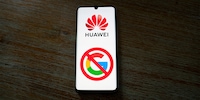
News + Trends
Huawei vs the US: the latest casualty of the trade war and its fallout
by Dominik Bärlocher
Microsoft may no longer work with Huawei. If the current situation persists, the company faces a possible change of operating system. The possibilities and consequences range from government proximity to in-house development.
The economic war between the USA and China has reached Huawei. Since Thursday, 16 May 2019, the Chinese company Huawei has been on the US blacklist. This means that American companies are no longer allowed to do business with Huawei. Google is now no longer allowed to work with Huawei.
Questions arose in yesterday's article.
Wanted to buy a MateBook X pro today - shouldn't there actually be a problem?
Does this only affect Huawei or also other Chinese companies? Huawei also sells notebooks with Intel hardware and Microsoft software, is this also prohibited in the future?
An enquiry to Microsoft Switzerland resulted in a short and concise answer:
Unfortunately, Microsoft Switzerland is unable to comment on this topic.
This may mean that discussions between the parties concerned have not yet progressed to the point where a unified message can be passed on to the media. This is in line with current media reports and the content of this article: a lot of speculation, a situation that changes by the hour and strong opponents who know all the tricks.
Huawei has a strong player in the laptop market with its Matebook series. The strategy is similar to that of Huawei's mobile business: strong hardware, competitive price. But unlike the mobile division, Huawei does not rely on an open operating system, because no matter what Mac users say, the world runs on Windows. Therefore, the choice of operating system with Windows makes the most sense.
The problem: Windows is a product from the United States and, according to the US government, will no longer be allowed to be shipped to China on 21 May 2019.
Current devices should not be affected if the current legal situation is in line with that of the Mobile Division. Microsoft Switzerland is not taking a position, which is why we can only speculate about a final decision or a currently correct legal situation.
On the other side of the conflict is Microsoft. The company has a keen interest in continuing to export to China. This is because the Chinese market is huge and productive. Statistics from the industry service Statcounter.com show that 40.08% of machines connected to the internet run on Android. 39.2% run on Windows, 14.81% on Apple iOS, 3.51% on Apple macOS or OSX, 1.97% on an unknown operating system and 0.4% on a Linux distribution.
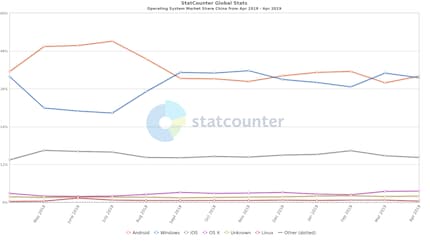
Of Windows computers, 50.12% run on Windows 7, 36.68% on Windows 10, 9.41% on Windows XP and the rest can be statistically neglected. Microsoft's business model has changed with Windows 10. The operating system is now not one that runs statically on your computer, but has aspects of a "software as a service" model. This means that updates can constantly change your operating system and further major releases are unlikely to take place, as Microsoft's Jerry Nixon described the operating system in 2015 as "the last version of Windows ever". This is precisely the crux of the matter: in theory, Microsoft could add more paid services with Windows 10, allow financial transactions in the App Store and thus keep the cash flow going. This is not the case with the previous versions. With Windows 7 and older, you buy the operating system once and then install updates until support can no longer take place.
If the decision of 21 May 2019 is upheld and no special authorisations or legal loopholes are exploited, it should no longer be possible for Microsoft to maintain the secondary cash flow under Windows 10. The fact that users of the operating system in China or on Chinese products would no longer receive updates is only a secondary problem, which could make life difficult for Huawei in particular.
The problem is rather that Huawei does not seem to have a valid alternative for Windows. Apple's macOS will only ever run on Apple products outside of hobbyist circles, Linux is virtually unknown in China and is only marginally used internationally. Worldwide, only 0.84% of all computers connected to the internet run on Linux.
This situation results in the following situation: Huawei wants Microsoft, Microsoft wants China. Because both parties stand to benefit billions from the partnership. In fact, the Chinese market is so important that Microsoft has its own headquarters in China.

Microsoft (China) Co., Ltd. is headquartered in the Chinese capital Beijing, according to stock market portal Bloomberg, and describes itself as follows:
Microsoft (China) Co., Ltd. develops and licences software and hardware products in China. It offers Office 365, a cloud-based subscription service; Windows 10 devices; Microsoft Surface Book 2 devices; and Xbox One consoles, games, accessories, and Xbox Live products. The company also provides software, PCs and devices, tablets, accessories, entertainment products, software products for businesses, developer and IT products, downloads and security solutions, education, and other products; and support services. It sells its products online. The company has strategic alliance with VIPKid to develop smart classroom technology. The company was founded in 1995 and is based in Beijing, China. Microsoft (China) Co., Ltd. operates as a subsidiary of Microsoft Corporation.
Translation:
Microsoft (China) Co., Ltd. develops and licences software and hardware products in China. It offers Office 365, a cloud-based subscription service; Windows 10 devices; Microsoft Surface Book 2 devices; Xbox One consoles, games and accessories; and Xbox Live products. The company also provides software, PCs and devices, tablets, accessories, entertainment products, business software products, developer software products, downloads and security solutions, education and other products; and other support services. It sells its products online. The company has a strategic partnership with VIPKid to develop smart classroom technology. The company was founded in 1995 and is based in Beijing, China. Microsoft (China) Co., Ltd. is a subsidiary of Microsoft Corporation.
VIPKid was founded in 2013 by Chinese entrepreneur Cindy Mi and is currently valued at three billion US dollars. VIPKid sees itself as the "largest English-language online classroom", offering English courses from native speakers to Chinese children. Teachers earn up to 22 US dollars per hour.
VIPKid is an important tool for the Chinese economy to tap into the West. Just like Windows is an important tool for Huawei to tap into the West and dominate markets as much as possible.
It is therefore conceivable that the company's headquarters in China can be used as a legal loophole in the US legislature so that the Windows service can be maintained. The assumption is that this is precisely the subject of the talks currently being held at Microsoft, but a solution cannot be conjured up in a matter of hours. What exactly this solution might look like is a matter for lawyers and business experts. But with a semi-independent company headquarters in Beijing, Microsoft has the best possible starting position here.
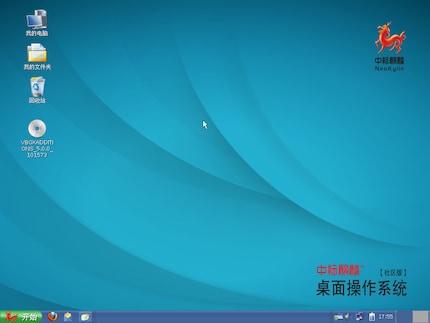
A few years ago, the story of a Chinese operating system haunted the media. In 2015, the business magazine Quartz visualised an operating system called NeoKylin, called KylinOS by the manufacturer, developed by the company China Standard Software.
The operating system looks similar to Windows XP in 2015, right down to the desktop background with a green hill. The South China Morning Post reported on 14 September 2015 that 40% of all computers sold by Dell are delivered with NeoKylin pre-installed.
According to Quartz, NeoKylin is a Linux distribution, although journalist Nikhil Sonnad is unable to say conclusively which major distribution the Chinese government has modelled itself on. However, he suspects that NeoKylin 6.0 is modelled on Fedora.
In Africa, a Kylin version called Ubuntu Kylin is in use, which runs on the current Ubuntu version 19.04. This also comes from China and is distributed under the development aid banner. Downloads for Ubuntu Kylin are available for free. The operating system is modelled on Windows 10 and has an app store and secondary funding sources.
NeoKylin is not a particularly attractive alternative for Huawei and the West. On the one hand, there is the connection to the Chinese military, which was employed in the development of Kylin. Secondly, the fact that Kylin's development is quite advanced.
For Huawei, the switch to Kylin makes little sense at the moment.
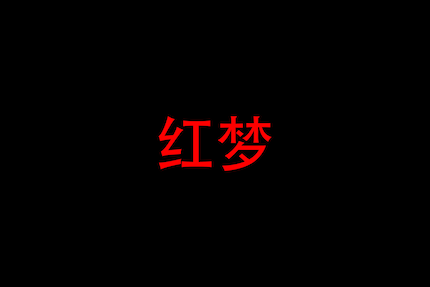
On 27 April 2018, the South China Morning Post reported that Huawei has been working on its own operating system for six years. According to the latest reports, wccftech.com it will be called HongMeng OS. Wccftech refers to a tweet from the Chinese news portal Global Times News.
.
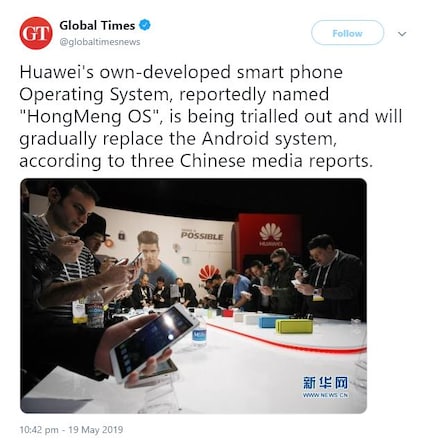
Huawei's own-developed smart phone Operating System, reportedly named
Translation:
Huawei's proprietary smartphone operating system, reportedly called
In an article, the pro-government tabloid Global Times reports that Huawei will withstand pressure that Google is being manipulated by politicians and that the Chinese Ministry of Foreign Affairs will use "legal weapons" to protect the interests and rights of Huawei and the Chinese market. However, the paper does not provide any sources.
So far, there has only been talk of HongMeng OS replacing Android on Huawei's smartphones. But with the switch to HongMeng OS, a development time of six years and a portfolio that goes far beyond smartphones, it is possible that the boundary between desktop operating system and mobile operating system will be abolished. The step towards a seamless ecosystem could succeed with HongMeng OS.
Margin note: HongMeng could, if the spelling "红梦" is correct, stand for "red dream".
If neither Kylin nor HongMeng OS is a valid alternative, the negotiations between Microsoft-Huawei-USA-China fail and the legislature remains as it is on 21 May 2019, then Huawei could fall back on a Linux distribution. The larger distributions such as Ubuntu, Fedora or smaller ones such as Mint are suitable. These are intuitive and pleasant to use for Windows users by default and have
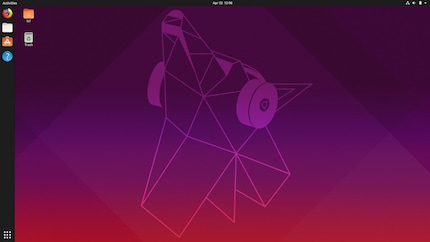
Huawei is free to create its own distribution or modify an existing one. If the company opts for the latter, it is possible that the development will be similar to Huawei's Emui. The operating system under the surface essentially remains the basic distribution and the company adds its own features and desktop environment.
All three visions for the future are currently pure speculation and by no means conclusive. Furthermore, the idea mentioned yesterday by Huawei USA would also be conceivable for collaboration with Microsoft. Without a statement regarding the Windows portfolio of Microsoft and/or Huawei, there is nothing definitive to say.
Huawei can deliver its new laptops without an operating system. This would be attractive for operating system enthusiasts and Linux fans. However, as there are not many of them, a solution for the general public is needed. This could come in the form of a kind of bootloader, i.e. a USB stick from which the Windows installation is started. This is comparable to the installation disc from the 1990s.
From a legal perspective, however, it would have to be clarified how the current regulation can be worked around.
Journalist. Author. Hacker. A storyteller searching for boundaries, secrets and taboos – putting the world to paper. Not because I can but because I can’t not.
From the latest iPhone to the return of 80s fashion. The editorial team will help you make sense of it all.
Show all